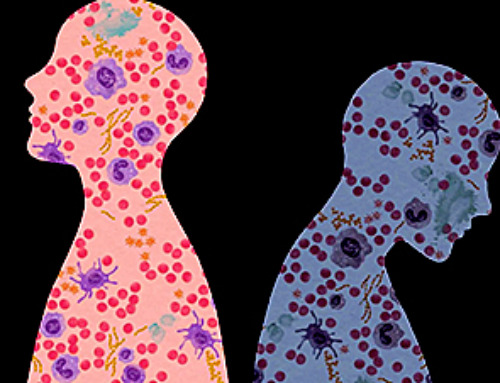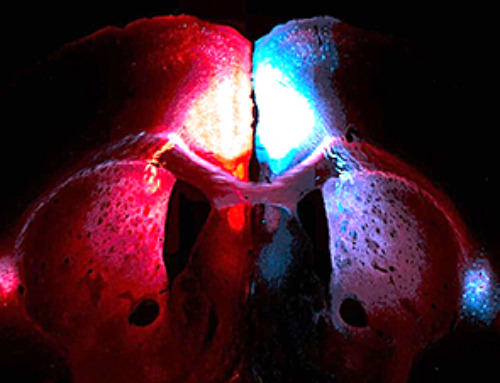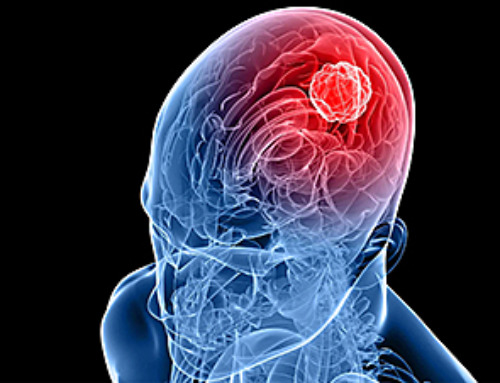A new study published in the Journal of Neuroscience indicates that the sense of smell is significantly influenced by cues from other senses, whereas the senses of sight and hearing are much less affected.
A popular theory of the brain holds that its main function is to predict what will happen next, so it reacts mostly to unexpected events. Most research on this topic, called predictive coding, has only focused on what we see, but no one knows if the different senses, such as smell, work in the same way.
To figure out more about how smell relates to how we handle different sensory impressions, the researchers conducted a study with three experiments, two behavioral experiments, and one experiment using the brain imaging method fMRI at Stockholm University Brain Imaging Centre (SUBIC).
"The main finding is that smelling was much more dependent on predictions than vision was. This is interesting because many people think that smell is primitive and reactive, when our research shows it is in fact quite sophisticated and proactive," says Stephen Pierzchajlo, PhD Student at the Department of Psychology, and main author of the study.
The study shows how important it is for our different senses to be able to use correct cues when we classify different sensory impressions.
Sensory Interactions and Predictions
"We have all experienced that we react to when an unexpected smell appears, for example when we enter someone's flat and encounter a new smell. Our research shows that the sense of smell is highly influenced by the cues from other senses, while the sense of sight and hearing are affected to a much lesser extent," says Jonas Olofsson, professor at the Department of Psychology, and co-author of the study.
The researchers also show that when the brain tries to identify odors that it had not expected, both the olfactory and visual brains are activated, despite the absence of visual cues in the task.
"The olfactory brain thus has a completely unique way of processing smells and it is about whether the smells are expected or not. The sense of smell warns us of smells that we had not expected, and engages the visual brain, perhaps to be able to see what it is that smells. It's a smart function because we humans are so bad at recognizing smells if we don't get clues," says Jonas Olofsson.
In the experiments, participants listened to spoken word cues, such as "lemon", and then received a picture or smell, and participants quickly decided whether it matched with the cue, for example with a lemon picture or smell, or did not match, for example with a rose picture or smell.
"We noticed that overall, the expected pictures and smells led to quicker decisions, which fits well with predictive coding theory. We used the difference in response speed to compare the senses with each other – a bigger delay for unexpected stimuli means that the sense relies more on predictions," says Stephen Pierzchajlo.
The study is the first concluded part of his PhD research.
"The human sense of smell is not a reactive, but a proactive sense. It uses a unique brain strategy to process unexpected smells in order to understand what the smells are," says Stephen Pierzchajlo.
Reference: "Olfactory categorization is shaped by a transmodal cortical network for evaluating perceptual predictions" by Stephen Pierzchajlo, Teodor Jernsäther, Lara Fontana, Rita Almeida and Jonas K. Olofsson, 31 March 2024, Journal of Neuroscience.
DOI: 10.1523/JNEUROSCI.1232-23.2024
The study was funded by the Knut och Alice Wallenbergs Stiftelse, Swedish Research Council, Stockholm University.
News
Blindness Breakthrough? This Snail Regrows Eyes in 30 Days
A snail that regrows its eyes may hold the genetic clues to restoring human sight. Human eyes are intricate organs that cannot regrow once damaged. Surprisingly, they share key structural features with the eyes [...]
This Is Why the Same Virus Hits People So Differently
Scientists have mapped how genetics and life experiences leave lasting epigenetic marks on immune cells. The discovery helps explain why people respond so differently to the same infections and could lead to more personalized [...]
Rejuvenating neurons restores learning and memory in mice
EPFL scientists report that briefly switching on three “reprogramming” genes in a small set of memory-trace neurons restored memory in aged mice and in mouse models of Alzheimer’s disease to level of healthy young [...]
New book from Nanoappsmedical Inc. – Global Health Care Equivalency
A new book by Frank Boehm, NanoappsMedical Inc. Founder. This groundbreaking volume explores the vision of a Global Health Care Equivalency (GHCE) system powered by artificial intelligence and quantum computing technologies, operating on secure [...]
New Molecule Blocks Deadliest Brain Cancer at Its Genetic Root
Researchers have identified a molecule that disrupts a critical gene in glioblastoma. Scientists at the UVA Comprehensive Cancer Center say they have found a small molecule that can shut down a gene tied to glioblastoma, a [...]
Scientists Finally Solve a 30-Year-Old Cancer Mystery Hidden in Rye Pollen
Nearly 30 years after rye pollen molecules were shown to slow tumor growth in animals, scientists have finally determined their exact three-dimensional structures. Nearly 30 years ago, researchers noticed something surprising in rye pollen: [...]
NanoMedical Brain/Cloud Interface – Explorations and Implications. A new book from Frank Boehm
New book from Frank Boehm, NanoappsMedical Inc Founder: This book explores the future hypothetical possibility that the cerebral cortex of the human brain might be seamlessly, safely, and securely connected with the Cloud via [...]
How lipid nanoparticles carrying vaccines release their cargo
A study from FAU has shown that lipid nanoparticles restructure their membrane significantly after being absorbed into a cell and ending up in an acidic environment. Vaccines and other medicines are often packed in [...]
New book from NanoappsMedical Inc – Molecular Manufacturing: The Future of Nanomedicine
This book explores the revolutionary potential of atomically precise manufacturing technologies to transform global healthcare, as well as practically every other sector across society. This forward-thinking volume examines how envisaged Factory@Home systems might enable the cost-effective [...]
A Virus Designed in the Lab Could Help Defeat Antibiotic Resistance
Scientists can now design bacteria-killing viruses from DNA, opening a faster path to fighting superbugs. Bacteriophages have been used as treatments for bacterial infections for more than a century. Interest in these viruses is rising [...]
Sleep Deprivation Triggers a Strange Brain Cleanup
When you don’t sleep enough, your brain may clean itself at the exact moment you need it to think. Most people recognize the sensation. After a night of inadequate sleep, staying focused becomes harder [...]
Lab-grown corticospinal neurons offer new models for ALS and spinal injuries
Researchers have developed a way to grow a highly specialized subset of brain nerve cells that are involved in motor neuron disease and damaged in spinal injuries. Their study, published today in eLife as the final [...]
Urgent warning over deadly ‘brain swelling’ virus amid fears it could spread globally
Airports across Asia have been put on high alert after India confirmed two cases of the deadly Nipah virus in the state of West Bengal over the past month. Thailand, Nepal and Vietnam are among the [...]
This Vaccine Stops Bird Flu Before It Reaches the Lungs
A new nasal spray vaccine could stop bird flu at the door — blocking infection, reducing spread, and helping head off the next pandemic. Since first appearing in the United States in 2014, H5N1 [...]
These two viruses may become the next public health threats, scientists say
Two emerging pathogens with animal origins—influenza D virus and canine coronavirus—have so far been quietly flying under the radar, but researchers warn conditions are ripe for the viruses to spread more widely among humans. [...]
COVID-19 viral fragments shown to target and kill specific immune cells
COVID-19 viral fragments shown to target and kill specific immune cells in UCLA-led study Clues about extreme cases and omicron’s effects come from a cross-disciplinary international research team New research shows that after the [...]





















